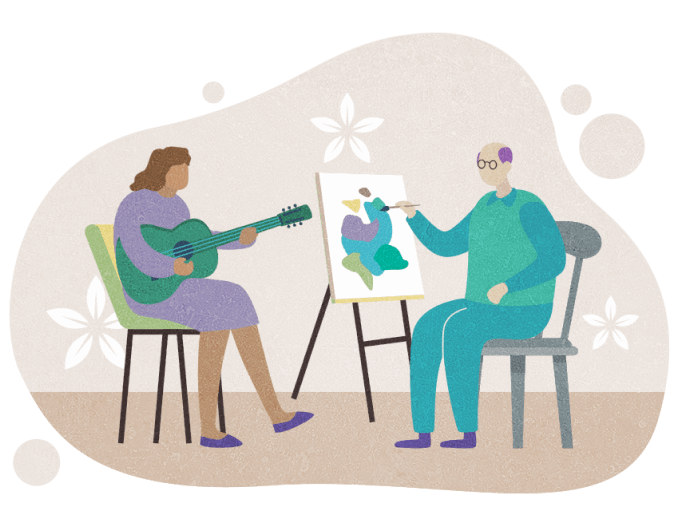The power of music and art therapy for dementia
![]()

The power of music and art therapy for dementia clients
Dealing with dementia can be a difficult journey for both the person with dementia and their carer. It’s a debilitating disease that can rob the person of their memories, communication skills, and sense of self. However, music and art therapy have shown to be effective ways of engaging with these individuals and improving their quality of life. In this post, we’ll explore the role of music and art therapy in dementia care and discuss how it can benefit you or your loved one.
Music therapy
Music has the power to evoke emotions, recall memories, and stimulate the brain in ways that other forms of therapy cannot. For people with dementia who struggle with communication, music therapy can provide a non-verbal way to connect with their surroundings and express their emotions. Through music therapy, carers can help stimulate memories while also providing a comforting and enjoyable experience. This treatment can take many forms – listening to personal playlists, attending concerts, singing, playing instruments, and even writing songs. Do have a look on the notice boards in your local supermarket or library for choirs, singing groups or reminiscence groups. These all use music as a form of community connection and support.
Art therapy
Art therapy is another effective way of engaging individuals with dementia. It involves using artistic media as a form of non-verbal communication, allowing those with dementia to express themselves in ways they may not be able to do verbally. Studies have shown that art therapy can help reduce aggressive behaviour, alleviate stress and depression, allow people to develop new hobbies, and even stimulate the brain. The creation of artwork can provide a way for those with dementia to communicate with their carers and loved ones, thus improving their relationships.
Benefits of therapies
Music and art therapy both have numerous benefits for those with dementia, including emotional and psychological relief, socialisation, improved cognitive abilities, and better memory retention. Studies have also shown that these therapies can help reduce insomnia and anxiety, as well as decrease agitation and aggression. By providing sensory stimulation and creative outlets, music and art therapy can help create a more positive and enriching experience for those living with dementia.
Tips for implementing music
and art therapy
Implementing music and art therapy may seem daunting at first, especially if you or your loved one are new to the experience. However, there are a few tips that you can follow to make the process easier. Start slowly and include activities which are familiar to the person with dementia, such as playing old songs or painting familiar objects. Use simple instructions that are easy to understand and allow the person with dementia to take the lead. Don’t worry about the end result: the therapy is the process of creating and communicating, not the final product.
Music and art therapy might seem unconventional, but the benefits of these therapies for those with dementia are undeniable. They provide a way for people to communicate, socialise, and express themselves in ways that might not have been possible otherwise. Carers can use this as an opportunity to make the experience of dementia more positive, which ultimately leads to a better quality of life. If you’re caring for someone with dementia, consider incorporating music and art therapy into their routine; it might be the key to unlocking a more fulfilling relationship. You can call 0208 857 7717 to learn more.
Speak to our team
We’re always happy to have a friendly, informal chat. Call 0208 857 7717 to discuss your live-in care requirements with a member of our team.
